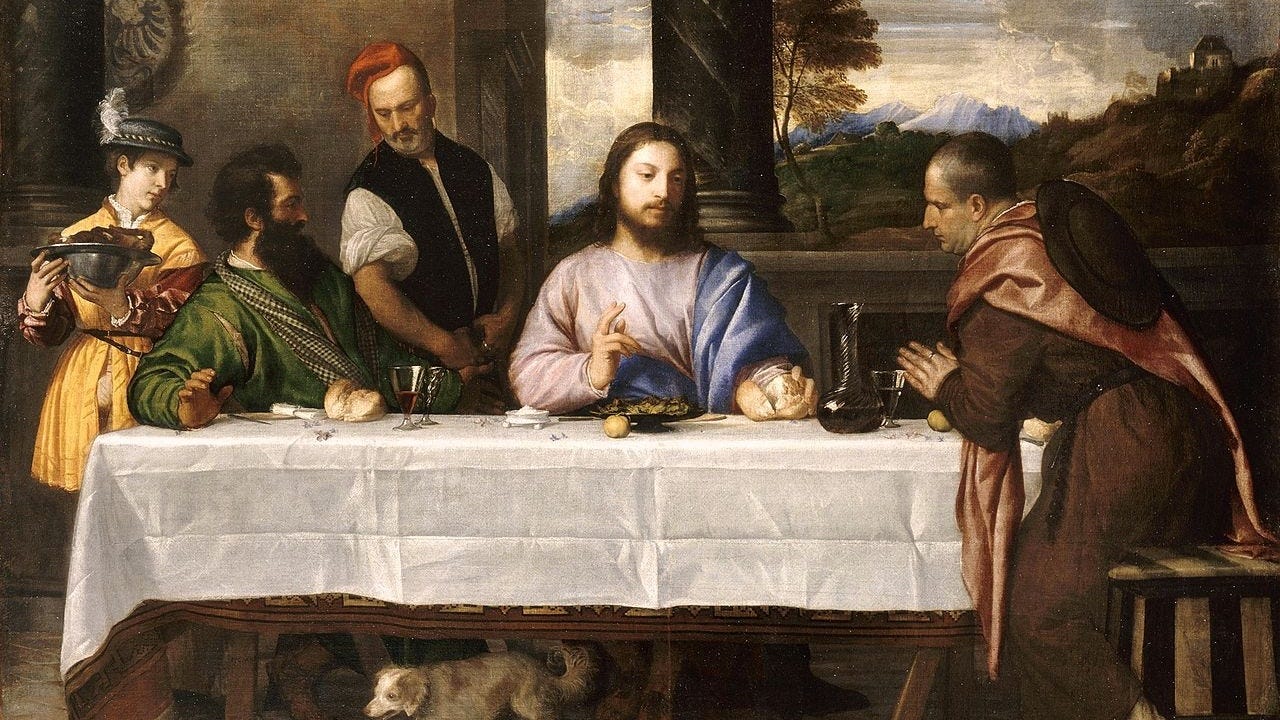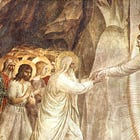How Christ restored faith on the road to Emmaus
Our Lord opened the Old Testament to his despondent disciples, so that they could know him in the 'breaking of the bread.'

Our Lord opened the Old Testament to his despondent disciples, so that they could know him in the 'breaking of the bread.’
Editor’s Notes
In this Part, Fr. Coleridge tells us…
How Christ sought out the sorrowful and scattered to rekindle their faith on Easter Day.
That divine charity moved him to console hearts wounded by the Passion before manifesting his glory.
Why the burning of their hearts under his words reveals the hidden fire of Scripture read with him.
He shows us that the Good Shepherd walks beside the disheartened, drawing them back by love and truth.
Easter Day
The Passage of Our Lord to the Father—Chapter XIV
St. Matt. xxviii. 2-15; St. Mark xvi. 2-13; St. Luke xxiv. 1-43; St. John xx. 1-29.
Story of the Gospels, § 173-177
Burns and Oates, London, 1892
Conversations of our Lord
It would seem, also, that our Lord spent a good part—who can tell how large a part?—of this His first Easter Day in thus gathering into His fold one soul after another who was so dear to Him, one in one way and another in another.
We cannot but feel grateful for having the account preserved to us by St. Luke, who has given us, what may be a specimen of many conversations of the kind in the narrative which we now subjoin, of His method of enlightening the blessed pair who shared His afternoon walk to the village of Emmaus. It is not impossible that there may have been many such conversations vouchsafed by our Lord to individuals, though only this one has been preserved for us with anything like length of detail—though even this is only full by comparison with the other relations.
But it shows our Lord quite in the character of the Good Shepherd, anxious about the sheep that might be tempted to wander from the fold, the company of the others, and to bring them back again as soon as was possible.
The walk to Emmaus
‘And behold two of them went, the same day, to a town which was sixty furlongs from Jerusalem, named Emmaus. And they talked together of all these things which had happened.
‘And it came to pass that, while they talked and reasoned with themselves, Jesus Himself also drawing near, went with them. But their eyes were held, that they should not know Him. And He said to them, What are these discourses that you hold one with another as you walk, and are sad?
‘And the one of them, whose name was Cleophas, answering said to Him, Art Thou only a stranger in Jerusalem, and hast not known the things that have been done there in these days? To whom He said, What things?
‘And they said, Concerning Jesus of Nazareth, Who was a prophet, mighty in work and word before God and all the people. And how our Chief Priests and princes delivered Him to be condemned to death, and crucified Him. But we hoped that it was He that should have redeemed Israel; and now, besides all this, to-day is the third day since these things were done. Yea, and certain women also of our company affrighted us, who before it was light were at the sepulchre, and not finding His Body, came, saying that they had also seen a vision of angels, who say that He is alive. And some of our people went to the sepulchre, and found it so as the women had said, but Him they found not.
‘Then He said to them, O foolish, and slow of heart to believe in all things which the prophets have spoken! Ought not Christ to have suffered these things, and so to enter into His glory? And beginning at Moses and all the prophets, He expounded to them in all the Scriptures the things that were concerning Him.
‘And they drew nigh to the town whither they were going, and He made as though He would go farther. But they constrained Him, saying, Stay with us, because it is towards evening, and the day is now far spent. And He went in with them. And it came to pass whilst He was at table with them, He took bread, and blessed, and brake, and gave to them. And their eyes were opened, and they knew Him, and He vanished out of their sight.
‘And they said one to the other, Was not our heart burning within us whilst He spoke in the way, and opened to us the Scriptures? And rising up the same hour they went back to Jerusalem, and they found the Eleven gathered together, and those that were with them, saying, The Lord hath risen indeed, and hath appeared to Simon. And they told what things were done in the way, and how they knew Him in the breaking of bread.’
The disciples who walked to Emmaus on that Sunday afternoon did not think themselves in any great danger of losing the faith which they had, but our Lord may have been aware of dangers which were not obvious to them, and it is a touching proof of His watchfulness over His flock that He should have left the care of Peter and James and Thomas to bring back these souls who may have been for the time in greater need.
We notice that they are said by our Lord Himself to have been sad, although He must have been pleased that they were speaking of Him. For the spirit of sadness is in truth the spirit of danger, and this is a great motive for our Lord’s gracious interference, especially when the great blow of the Passion had so lately fallen to dispirit and perplex them. It would have been a boon which many devout servants of our Lord would have been very grateful for, if He had so willed it that the disciples should have been able to give some chronicle of the argument, so to call it, by which our Lord set before the two companions the things concerning Himself in the Scriptures of the Old Testament, beginning from Moses.
But it was clearly His will, at this time, not to say anything that might imply a wish to take on Himself the office which He had now, as it were, passed on to the Church, notwithstanding the fact that while He was speaking of these things the hearts of those who heard Him seemed to be kindled by a special fire of Divine love. ‘And they said one to the other, Was not our heart burning within us whilst He spoke in the way, and opened to us the Scriptures?’
The breaking of bread
It may fairly be questioned whether when He became known to them in the breaking of bread, it is meant that we are to understand that He administered to them His own precious Body and Blood sacramentally or not, or whether it was not a simple recurrence to His habitual reverence and devotion in partaking of food.
It seems as if this appearance of our Lord to the two disciples was another careful device of His for the end of preparing the Apostles themselves for the sight of Himself. For it does not appear that the whole company of the Eleven had as yet seen Him, though we gather from the account given by St. Paul that at least St. Peter had had his own special and personal visit,1 which indeed St. Paul puts first in his list, and perhaps St. James, and others not named. It is easy to see that there was a special reason why the chief of the Apostles should have been favoured in this manner, after his fall and signal repentance, and as having the charge given to him of confirming his brethren.
We can imagine the intense joy of our Blessed Lord in thus crowning the pardon which He imparted to the penitent Apostle, and the special assurance which he would receive from his Master of the continuance and confirmation of His love. He did not, however, confer upon St. Peter any great privilege of which we are told, reserving gifts of that kind for occasions when others besides St. Peter were to some extent to have a share of their own in the prerogatives which were granted at the time, that the Church might know the gifts received by her Chief Shepherd by the evidence of others besides himself.
But he and they were doubtless prepared by the loving Providence which arranged all these manifestations, and others which may have taken place in the course of this Easter Day, for the fulness of faith which He longed to see in them, and which was to have fruits so permanent and glorious in the conversion of the world.
Succession of manifestations
All these manifestations seem to succeed one to the other naturally and almost accidentally, but the end and issue of all of them was that by the nightfall of the first Easter Day the belief in the Resurrection of our Lord was firmly established in the Body of the Church, the chief pastor who had been made its appointed head, the governing community of the Apostles, and in scores of individual souls of every class of the little community.
In the next part, Fr Coleridge reflects on Our Lord’s apparitions to the Apostles on Easter Sunday.
Subscribe now to never miss an article:
Easter Day
Read Next:
Here’s why you should subscribe to The Father Coleridge Reader and share with others:
Fr Coleridge provides solid explanations of the entirety of the Gospel
His work is full of doctrine and piety, and is highly credible
He gives a clear trajectory of the life of Christ, its drama and all its stages—increasing our appreciation and admiration for the God-Man.
If more Catholics knew about works like Coleridge’s, then other works based on sentimentality and dubious private revelations would be much less attractive.
But sourcing and curating the texts, cleaning up scans, and editing them for online reading is a labour of love, and takes a lot of time.
Will you lend us a hand and hit subscribe?
Follow our projects on Twitter, YouTube and Telegram:
1 Cor. xv. 5.




